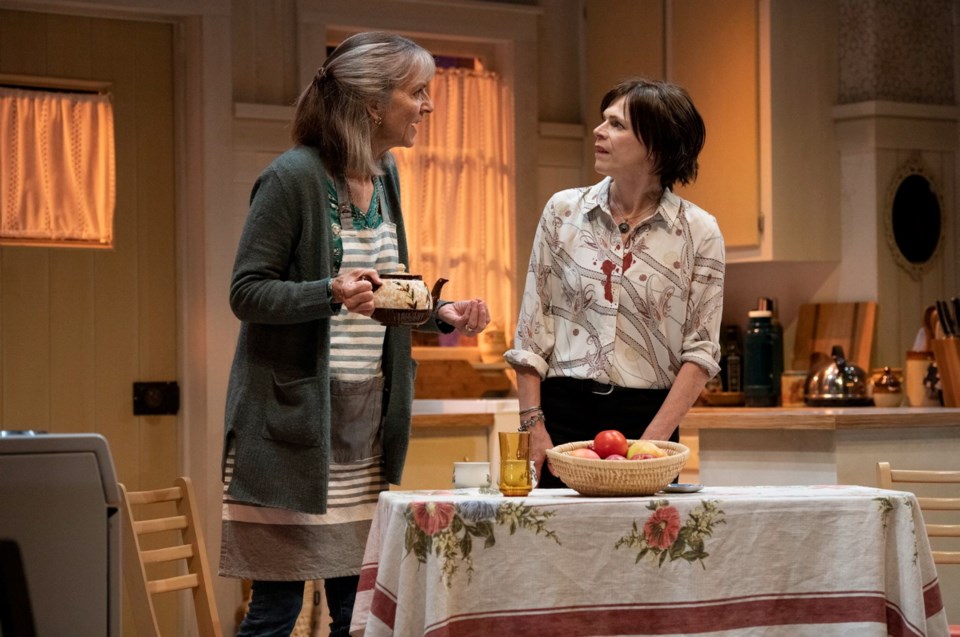A drama about a nuclear meltdown may sound grim. Certainly Lucy Kirkwood’s 2016 play The Children is stern enough stuff, despite the dark humour leavening the journey.
At the same time, the British dramatist’s cerebral play is deeply romantic in the do-or-die moralistic tradition of Greek drama.
The Children is both a tragic love story (or rather, stories) and an archetypal hero’s journey. And it’s highly compelling theatre to boot.
A retired English husband and wife — both nuclear physicists — are visited by an old colleague in the aftermath of disaster.
The trio once worked together in a nuclear power plant that melted down, spreading deadly radiation. The couple, Hazel (Nancy Palk) and Robin (Joseph Ziegler), live in a seaside cottage outside the most contaminated zone.
Their unannounced guest, Rose (Brenda Robins), eventually reveals the plan that’s behind her visit. It’s dangerous, as it is brave and idealistic.
It’s at this point — which comes a full hour into a talky play — that The Children shifts from low to high boil.
It’s a gripping, thought-provoking play.
Like a truth-seeking missile, Kirkwood is utterly unafraid of delving into life’s fundamental paradoxes.
The Belfry Theatre’s just-opened production is well worth seeing, thanks to solid acting (Robins is particularly good), thoughtful direction and the sympathetically stark set and lighting.
When we meet Rose, her blouse is spattered with blood — Hazel, unused to visitors, had been frightened and had instinctively struck her. She chats to Rose with apparent friendliness, busying herself with domestic tasks in an all-cream kitchen that looks both inviting and sterile.
We learn life is not as normal as it first appears. The “disaster” has left Hazel and Robin with sporadic electricity, no computers and a meatless diet.
Portrayed by Palk as a brittle, self-contained woman continually struggling to contain her anger, super-organized Hazel is desperate to achieve normalcy in post-apocalyptic times. She counts on daily routine for her salvation: doing yoga, brewing tea, fixing healthy meals and listening to BBC radio (although a wind-up battery must be cranked to do so). Husband Robin is more relaxed — tossing out sarcastic witticisms and swigging parsnip wine.
Rose is the most enigmatic and interesting of the three. Something of a failed romantic, she’s a lone wolf who has lived a hedonistic life.
When Hazel criticizes her own parents for spending their retirement sitting in armchairs and drinking boxes of wine, Rose quips: “Sounds OK.”
“No, it wasn’t OK,” responds Hazel. “It was death.”
The story of an old love triangle eventually surfaces. Robin was once a ladies’ man with a roving eye.
Hazel is aware of his past transgressions. However, her suspicions are rekindled when Robin — who ostensibly hasn’t seen the couple for 38 years — is strangely familiar with the whereabouts of teacups and water containers in the cottage.
At first, we believe the women are old friends, that is, until Hazel starts lobbing remarks that sting. Kirkwood handles the tone with consummate skill.
This conversation, at times reminiscent of Who’s Afraid of Virginia Woolf?, straddles the fence between humorous repartee and tiny razor cuts.
Robins, sporting a boyish bob, comes off as a curiously androgynous persona. Her Rose looks almost like a young Mick Jagger with tight slacks and high boots. In opening scenes, the character isn’t particularly likable.
What gets us on Rose’s side is her willingness to unflinchingly embrace difficult truths. The actor captured this awfully well on opening night, offering an incisive and unforgettably powerful performance.
Ziegler successfully becomes a faded genial libertine, almost a walking ghost. During this performance, he stumbled on several lines, something that will improve as the run continues.
Michael Shamata directs with a firm understanding of the playwright’s intent; there’s a sense the flows and eddies of a complicated script are thoroughly parsed. Alan Brodie’s lighting is notable. Orange sun filters through a window, turns blue as dusk falls, then is replaced by the cold, hard light of portable lanterns.
Kirkwood tackles life’s philosophical dilemmas with adroitness and verve.
The Children is a brave and rewarding play about the nature of morality, love and human purpose. It offers no easy answers. Rather, it poses the questions we must all ask ourselves.



